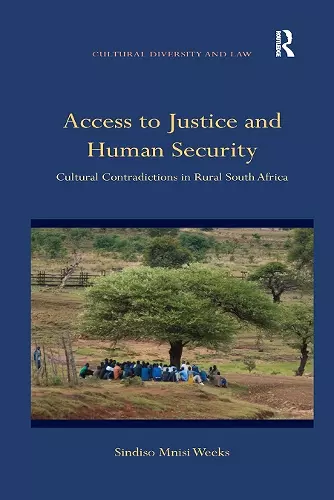Access to Justice and Human Security
Cultural Contradictions in Rural South Africa
Format:Paperback
Publisher:Taylor & Francis Ltd
Published:12th Dec '19
Currently unavailable, and unfortunately no date known when it will be back
This paperback is available in another edition too:
- Hardback£150.00(9781138060777)

For most people in rural South Africa, traditional justice mechanisms provide the only feasible means of accessing any form of justice. These mechanisms are popularly associated with restorative justice, reconciliation and harmony in rural communities. Yet, this ethnographic study grounded in the political economy of rural South Africa reveals how historical conditions and contemporary pressures have strained these mechanisms’ ability to deliver the high normative ideals with which they are notionally linked. In places such as Msinga access to justice is made especially precarious by the reality that human insecurity – a composite of physical, social and material insecurity – is high for both ordinary people and the authorities who staff local justice forums; cooperation is low between traditional justice mechanisms and the criminal and social justice mechanisms the state is meant to provide; and competition from purportedly more effective ‘twilight institutions’, like vigilante associations, is rife. Further contradictions are presented by profoundly gendered social relations premised on delicate social trust that is closely monitored by one’s community and enforced through self-help measures like witchcraft accusations in a context in which violence is, culturally and practically, a highly plausible strategy for dispute management.
These contextual considerations compel us to ask what justice we can reasonably speak of access to in such an insecure context and what solutions are viable under such volatile human conditions? The book concludes with a vision for access to justice in rural South Africa that takes seriously ordinary people’s circumstances and traditional authorities’ lived experiences as documented in this detailed study. The author proposes a cooperative governance model that would maximise the resources and capacity of both traditional and state justice apparatus for delivering the legal and social justice – namely, peace and protect
'This is an important book at a crucial time. It is important because it is a rare anthropological study of how traditional courts function in one part of the country, Msinga. It comes at a crucial time as the question of how to regulate traditional courts has perplexed South African policy-makers for decades and attempts at doing so have so far failed. A key insight of the book is that traditional courts should not be equated to courts but are better understood as vernacular forums for local dispute resolution. The author argues persuasively that regulation of these fora should seek to foster their capacity to be successful mediators of community conflict.'
Kate O'Regan, University of Oxford, UK, and former Judge, Constitutional Court of South Africa
'The lasting contribution of the book lies in the author’s ability to demonstrate the complexities of traditional justice mechanisms and the dilemmas of rural people who depend on them, especially women, while offering some hope that these mechanisms, and the core values underpinning them, can be strengthened to make these systems a viable component of the states’ strategies to provide real access to justice for these communities.'
Thandabantu Nhlapo, University of Cape Town, South Africa
'This book is a must-read for anyone concerned with access to justice by the rural poor in the developing world. Combining ethnography and political economy to good effect, and informed by a sophisticated conceptual framework, the book provides compelling arguments on the contradictory nature of ‘traditional’ mechanisms for resolving disputes in rural South Africa. It also outlines convincing arguments for a co-operative governance model of dispute resolution. A tour de force…'
Ben Cousins, Institute for Poverty, Land and Agrarian Studies, University of the Western Cape, South Africa
ISBN: 9780367889111
Dimensions: unknown
Weight: 453g
274 pages